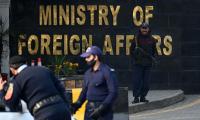Islamabad : As there is a lack of functional and effective local body infrastructure in the country, particularly in Punjab province, it seems that the government is failing to reach out and providing relief to poor and marginalised communities in the rural areas amid novel coronavirus (COVID-19) crisis.
The next wave of the pandemic in Pakistan would be our rural areas and to protect the agri-worker and rural economy, the federal government must ensure effective coordination through Council of Common Interest (CCI) and ensure preparedness at tehsil and union council levels.
This was the crux of the online policy dialogue titled 'Rethinking Development amidst COVID-19 Crisis' organised by the Sustainable Development Policy Institute (SDPI) here.
Executive Director, SDPI, Dr. Abid Qaiyum Suleri said that the government is not effectively utilizing the potential of Ministry of Inter Provincial Coordination and constitutional forum of Council of Common Interest (CCI) in this time of crisis and hence failing in effective coordination and collaboration.
He said that our National Command and Control Authority may help overcome the national level operational challenges but may not be able to resolve the political differences among center and provinces, which can only be resolved through CCI.
Dr Abid stressed the need for protecting the agriculture workers and rural economy through effective preparedness at the union council level to prevent spread of COVID-19 and ensuring the protection of whole food supply chain.
He said all federal and provincial government must collaborate and must be on the same page to fight COVID-19.
Dr Daanish Mustafa, Faculty Member at Department of Geography, King's College London while stressing the need for efficient public administration said the government should involve the local people in policymaking as local knowledge is essential to bring effectiveness in policy response for longer time.
He urged the government to adopt problem solving approach to deal with disaster management by taking local government and people in to the loop.
Joint Executive Director, SDPI, Dr Vaqar Ahmed said that it was our collective failure, because we all fail to assess the COVID-19 crisis and unable to prepare ourselves to cope with in advance. He said a large part of solution lies in developing our understanding around local body system to work. Dr Vaqar said COID-19 pandemic is also seen an opportunity at huge scale for research community to witness how challenges are evolving and researchers are being forced out of their own comfort zone to think how to help policy makers in responding those challenges. In the context of rethinking development, Dr Vaqar stressed the need for rethinking through the channel determined by SDGs, and National development plans should reflect these goals.
Dr Nousheen Anwar, head of Karachi Urban Lab said in response to COVID-19 pandemic the world has diverted it focus on environment from mega development.
She said, previously, issue of health wasn’t priority at all which now comes in a bigger way and raise concern on how will this pandemic can affect the broader context of climate change agenda.
Dr Imran Khalid, Head Climate Change Departments at SDPI while moderating the session said that COVID-19 is a window of opportunity for the world to really rethink the approach to development and research agenda.
A delegation from Timor-Leste, headed by Ms Veronica Das Dores, Minister of Social Solidarity and Inclusion, on a...
Pakistani Ambassador to China Khalil Hashmi seen in this image. — APP/FileIslamabad:China-Pakistan investment and...
In this image, Child Protection Institute building can be seen. — X/@mohrpakistan/File Islamabad: Child Protection...
The National University of Modern Languages building seen in this image released on November 11, 2022. —...
President of the International Islamic University Islamabad , Prof Dr Hathal bin Hamoud Al-Otaibi, and Rector IIUI, Dr...
A representational image of a handcuffed person behind bars. — AFP/FileRawalpindi:In a significant breakthrough,...







